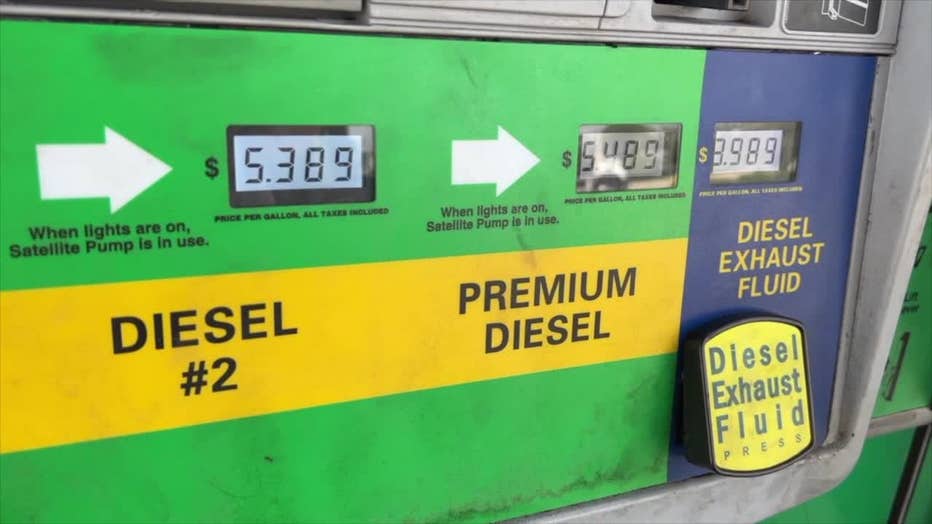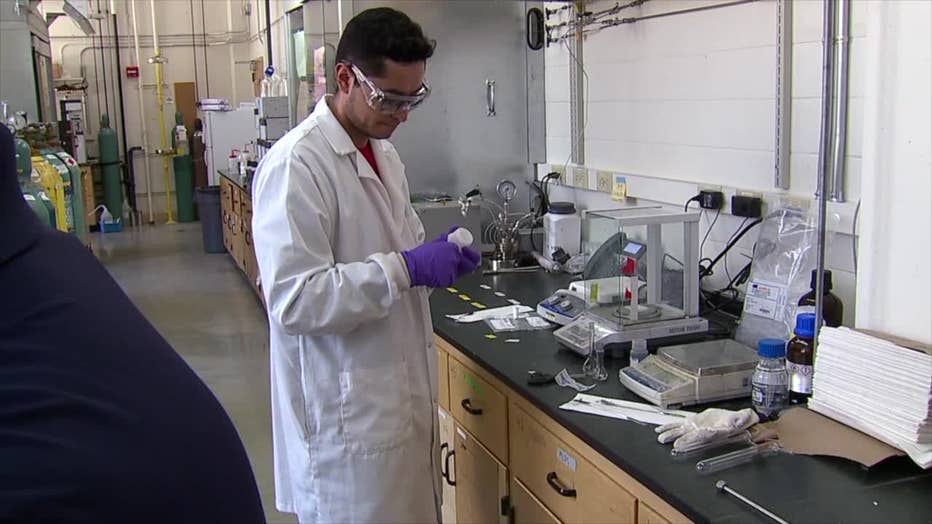UW-Madison alternative fuels researcher applies for corn-to-diesel patent
UW-Madison alternative fuels researcher applies for corn-to-diesel patent
While fuel prices continue to rise, UW-Madison researchers are exploring alternative fuels and have applied for a patent for a process to turn corn into diesel fuel.
MILWAUKEE - As fuel prices surge, there is a race to give consumers relief through green alternatives. Inside University of Wisconsin-Madison labs, there is a possible breakthrough, something for which UW is seeking a patent.
FOX6 was the first to report this development.
"It’s got to be a reality. It’s the only option we have. Because we know some day we’re going to run out of oil," said George Huber, a chemical engineering professor at UW-Madison.
Huber is trying to create the fuel of the future: "I’d rather pay a Wisconsin farmer to grow my fuel than send my money to the Middle East, or to Russia, or to some other country."

George Huber
In Huber's lab, researchers are starting with catalysts, which then reacts with corn-derived ethanol. The product of this chemical reaction is called "ether." The ethers from Huber's lab are then blended with normal diesel fuel, and researchers are seeing how it performs in powering an engine.
"We do think it’s going to be successful. The data that we are collecting until now are really encouraging," said Srinath Subramanian, a UW-Madison mechanical engineering doctoral student. "Our testing has proven that we do not expect anything bad to happen to the engine."
That means no change would be required for the trucks that would use the fuel. Researchers also hope the whole process and product will be better for the environment.
"The goal of the project is to see 50% reduction in CO2 emissions," Subramanian said.
However, researchers cannot put a number on what it would mean for diesel fuel prices

Diesel fuel
"We have to do experiments in the lab, and we have to see, does it make sense from a business point of view?" said Huber. "When we look at profitability, we look at what return would you get on this very large investment."
When the research is completed, Huber estimates it would take hundreds of millions of dollars to create the plants that would produce the fuel.
"It takes 5 to 10, 15 years to develop these technologies to get them to the commercial level. It’s not something that happens overnight."
The professor has been working on alternative fuels for more than 20 years.
"People said I was crazy," Huber said of his early desire for this research.
But over time, support came his way. Huber's research right now is funded by the U.S. Department of Energy. He's applied for a new grant to help him finish the research.
Earlier, ExxonMobil and even the U.S. Department of Defense funded his work.
FREE DOWNLOAD: Get breaking news alerts in the FOX6 News app for iOS or Android.
"They were funding this research because they said: ‘Hey, if oil goes over a $100 barrel, how are we going to be able to fight a war?" Huber said. Oil reached $123 dollars per barrel this week.

UW-Madison alternative fuels research
Huber said he applied for a patent for the ethanol ether diesel fuel, just as fuel prices reach record levels. The St. Louis Federal Reserve Bank price tracker shows the nationwide average of diesel is now $5.71 a gallon, as of Monday, June 13. Compare that price with February 14, when it was $4.01, and last year, it was $3.28.
"In the 27 years I’ve been driving, this is the highest it’s ever been," said Michael Garrett, a semi-truck driver from Ohio.
Garrett added it costs $2,500 per week to fill his tank. "It’s ridiculous. We’re not making any money because we’re putting it all into fuel, basically."
SIGN UP TODAY: Get daily headlines, breaking news emails from FOX6 News
While it took nearly three decades of driving for Garrett to see fuel prices this high, he hopes solutions arrive before another 27 go by.
"If they could come up with some better ideas, I’m all for it," Garrett said.
"The high prices are going to drive development in some of these alternatives. And you’ll see this: oil prices will go up, and everybody will invest in alternatives, and then they’ll go down and we’ll see, ‘We don’t need them, let’s just do our current technologies,’ which is drill for oil," Huber said.
The research won't provide immediate relief. The professor said putting corn-derived diesel fuel into trucks near you could take another three to seven years.

